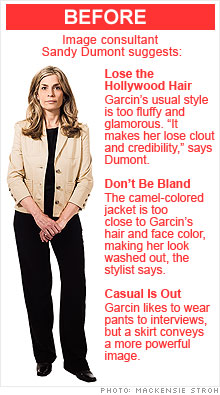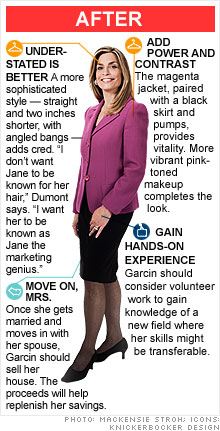Few interviews, no offers, living on savings
Marketing executive Jane Garcin, 51, put her job search on hold in August to care for her dying mother; by the time Garcin began looking in earnest at the beginning of this year, the economy had tanked.


(Money Magazine) -- Name: Jane Garcin
Age: 51
Home: New Haven County, Conn.
Profession: Marketing exec
Salary at last job: $150,000
Special skills: Innovative marketing campaigns
Personal: Divorced, but getting married in the fall; son in college
As the economy went into a tailspin last year, so did Jane Garcin's life. In August her mother took a turn for the worse in her battle with cancer, and Jane was laid off from her $150,000-a-year job as chief marketing officer for a commercial property company.
She took time off to care for her mom, who died in the fall, and then to settle the estate. When she began her job hunt in earnest in January, unemployment had skyrocketed and marketing jobs had all but dried up.
Since then Garcin has contacted recruiters, scoured the Internet, networked in her industry, formed a support group with other professional women, and even placed creative display ads in local newspapers offering her services. But she's had only a few interviews and no offers.
Meanwhile, she has been living on her savings (she has $165,000 in bank accounts and CDs) and unemployment. "I used to think there was a direct correlation between your investment of time and energy and the outcome of your job search," she says. "I'm not so sure anymore."
With tuition bills looming for her son, who'll start his junior year of college next fall, and little money saved for retirement, Garcin definitely needs a job - and soon. "I know there are positions out there," she says. "I want to know what I should be doing that I'm not already doing."
Career coach Roy Cohen and executive recruiter John Ferneborg recommend:
Meet strangers. Garcin has done a great job of networking with people she knows but must take more initiative to meet new people, the experts advise. She should create a list of marketing executives with good reputations and contact each one, explaining that she is rebuilding her network after caring for an ill parent.
"You are in a role very similar to what I'd like to do," she should say. "I'm sure you get lots of calls from recruiters about jobs you may not be interested in. Perhaps once you get to know a bit more about me, you'll feel comfortable referring me."
She should then offer to meet the contact in person, share inside industry information, ask for advice, and stay in touch. "This is a great way to find out about searches that are not so public," says Cohen.
Try consulting. Garcin has concentrated her efforts primarily on finding a permanent staff position. But she must stress to every business connection she meets that she is also interested in consulting work. In addition to generating income, such projects will give her interesting things to talk about while networking, keep her current on industry developments, and maintain her morale as well.
But, warns Ferneborg, "you still have to job-hunt actively while you freelance, because if you lose momentum and the consulting gig ends, you're back to zero."
Look in other industries. Garcin spent more than 10 years at high-tech companies, so she's been focusing her search there. But, says Cohen, "she should position herself as a marketing expert, not an industry expert."
He suggests emphasizing her diverse experience in different kinds of businesses and targeting companies in growth sectors (hospitals, colleges, alternative energy) as well as struggling industries (restaurants, retail) that need marketing help. To learn about a new field, Garcin should attend conferences and take professional classes as needed.
Financial planner Don Lord suggests:
Sell the houses. Fortunately Garcin has enough in savings to cover her living expenses and her son's college bills ($22,000 a year) for two more years if she has to. But her underfunded retirement portfolio (just $85,000) is a major concern.
Lord's advice? Beef it up by earmarking for retirement the $184,000 she expects to get from the sale of her mother's house. She could probably add another $100,000 to the kitty by selling her house when she gets married in the fall and moves in with her new husband.
Although Garcin is hesitant to sell now, when houses in her area have lost nearly 30% of their value, that may be a better option than renting the place out. Lord's rationale: If you're not cut out to be a landlord, don't even try, especially since the rent may not cover your carrying costs.
Get more aggressive. Garcin is a conservative investor who has just 35% of her portfolio in stocks. But to provide the growth she'll need to live comfortably when she quits working for good in 15 years or so, Lord suggests she bump up that allocation to 65%.
If she finds consulting work, she can add even more to her nest egg by establishing a solo 401(k). Under this plan, she can set aside up to 100% of the first $22,000 she earns as a freelancer (considered the employee contribution), plus another 20% (the employer contribution).
Garcin remains upbeat, especially after hearing from the experts. She particularly liked the tip about asking sought-after marketing execs to send recruiters her way. And she likes her new look too: "Definitely more professional."
She'll try anything to end her long jobless spell. "Those last months with my mother were so precious that losing my job may have been a blessing in disguise," she says. "But now I'm really ready to go back to work."
The challenge: Downsizing expectations
The challenge: Re-entering after retirement
Got a question about your job search for our experts? Send your questions to realstories@cnnmoney.com and they could be answered in an upcoming story. ![]()



